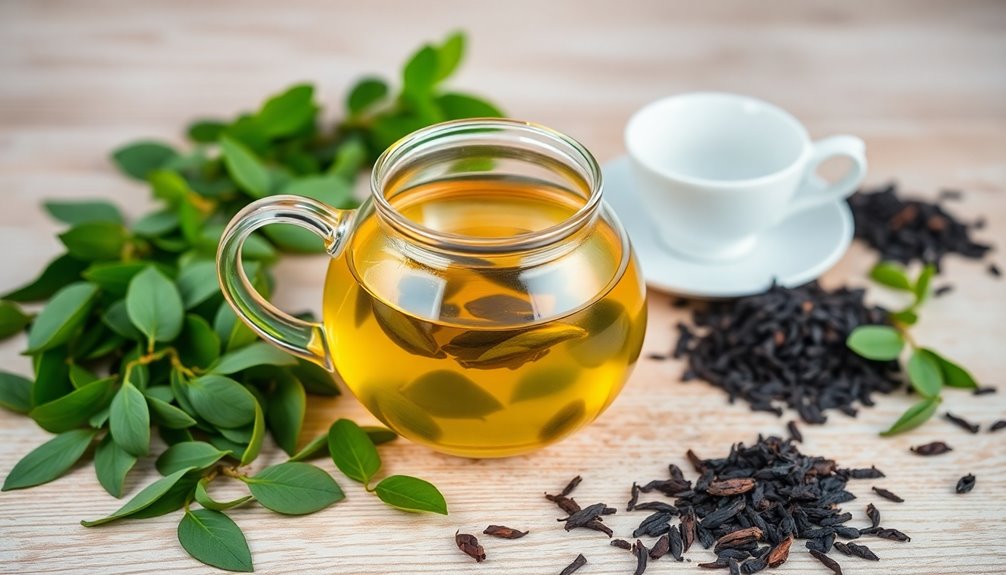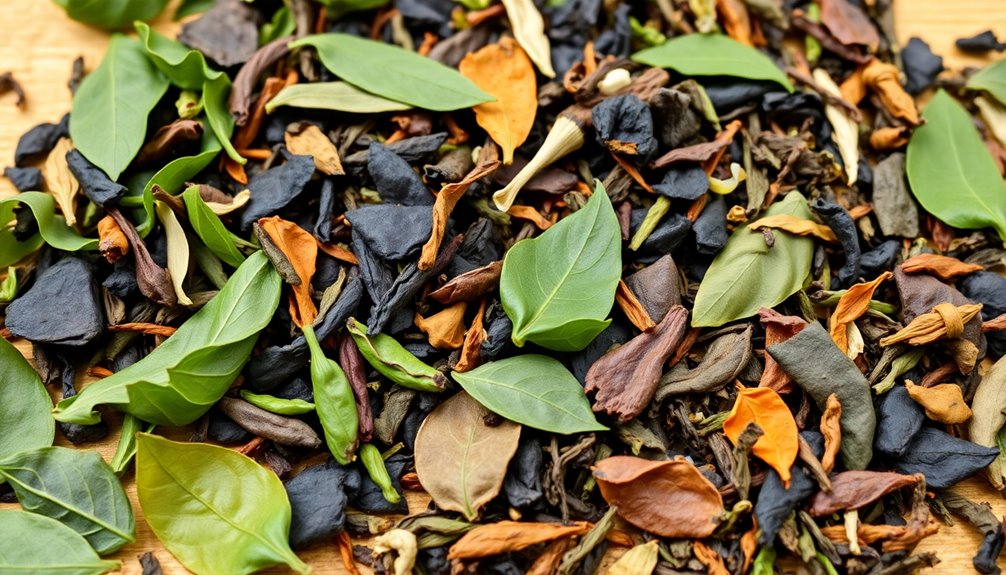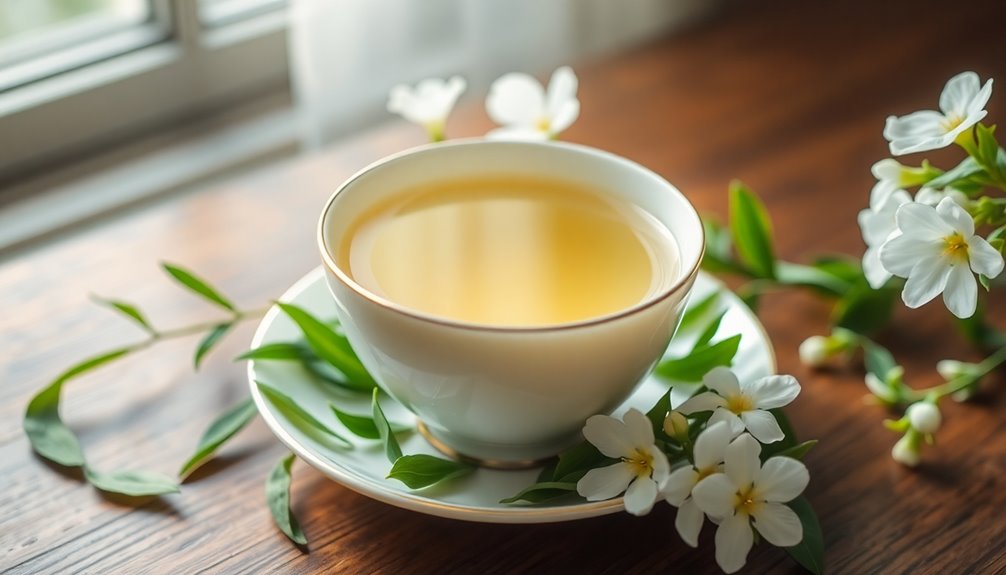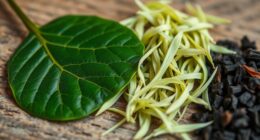Rooibos tea is a caffeine-free powerhouse, perfect for everyone, including kids and pregnant women. It's packed with antioxidants, especially aspalathin, which supports skin health and helps manage blood pressure. This tea comes from South Africa, where it's cherished for its unique taste and cultural significance. You can enjoy it hot or cold, and its natural sweetness means you won't need extra sugar. Plus, it's low in calories, making it a great choice for weight management. Sip on rooibos without worry, and you'll discover even more about its benefits and origins!
Key Takeaways
- Rooibos tea is naturally caffeine-free, making it suitable for all ages, including children and pregnant women.
- It contains high levels of antioxidants, particularly aspalathin, which supports overall health and wellness.
- The tea's anti-inflammatory properties help reduce oxidative stress and improve liver health.
- Its soothing effects can aid digestion, making it a great option after meals.
- Rooibos can be enjoyed at any time without causing sleep disturbances or jitters.
Introduction

Rooibos tea has gained popularity in recent years for its unique flavor and numerous health benefits. This delightful beverage is naturally caffeine-free, making it perfect for anyone sensitive to stimulants, including children and pregnant women. You can enjoy Rooibos at any time of day without worrying about sleep disturbances or jitters that often come with caffeinated drinks.
One of the standout features of Rooibos is its rich antioxidant content, especially aspalathin. These antioxidants offer various health benefits of Rooibos, such as supporting skin health and potentially aiding in blood pressure management.
Plus, Rooibos has a mild flavor that many find soothing, making it an excellent choice for relaxation. Unlike traditional teas, Rooibos is low in tannins, which means you can steep it longer without it becoming bitter.
So, whether you're winding down at night or looking for a comforting afternoon drink, Rooibos is a fantastic option. With its many health benefits and delicious taste, it's no wonder Rooibos has become a go-to choice for tea lovers everywhere.
Give it a try, and you might just find your new favorite drink!
South African Herbal Tradition

For over 300 years, the indigenous Khoisan people of South Africa have cherished Rooibos tea, not just as a refreshing drink but also for its soothing health benefits. This herbal tea, derived from the plant Aspalathus linearis, has been a staple in their culture.
You'll find that Rooibos tea is caffeine-free, making it a great choice for anyone looking to avoid stimulants.
The Khoisan have long used Rooibos for its health benefits, including relief for digestive issues and other ailments. The tea's unique flavor comes from careful harvesting and fermentation methods, which have been passed down through generations.
Since the 1930s, when Rooibos was first cultivated, it gained popularity, especially during World War II when tea imports were limited.
Today, Rooibos tea isn't just a South African tradition; it's gaining recognition worldwide as a health-conscious beverage. By sipping on this delightful tea, you connect with the rich heritage of indigenous communities and enjoy the benefits that Rooibos offers. Additionally, like yerba mate, Rooibos is known for its health benefits that include antioxidants and anti-inflammatory properties, making it a valuable addition to a wellness-focused diet.
Rich in Antioxidants

Packed with antioxidants, Rooibos tea offers a powerful boost to your health, making it a fantastic choice for those seeking to enhance their well-being. The antioxidants found in Rooibos tea, especially polyphenols and flavonoids, help combat oxidative stress, which can harm your cells and overall health. By drinking this delightful tea, you're supporting your body in fighting off the damage caused by free radicals. Herbal teas, like Rooibos, are known for their health benefits and can be easily incorporated into your daily routine.
One unique antioxidant in Rooibos is aspalathin, which is linked to skin health and may even have cancer-preventive properties. If you choose green rooibos, you'll be getting ten times more aspalathin than in red rooibos! Additionally, Rooibos tea is caffeine-free, making it an excellent choice for those who are looking to avoid caffeine intake while still enjoying a flavorful beverage.
Regularly sipping on Rooibos tea can also improve your overall antioxidant status, leading to better health outcomes. Furthermore, the anti-inflammatory properties of Rooibos antioxidants can help reduce oxidative stress, benefiting your liver health and recovery from injuries. Additionally, the health benefits of Rooibos include support for digestion, making it a soothing option after meals.
Rooibos in South African Culture

Known for its health benefits, rooibos tea also holds a special place in South African culture. This delightful red bush tea has been enjoyed by South African indigenous communities, especially the Khoisan people, for over 300 years. They value it for its refreshing taste and medicinal properties. The word "rooibos" means "red bush" in Afrikaans, highlighting its unique reddish-brown color from the fermentation process.
In social settings, rooibos tea symbolizes hospitality and community. You might often see it served with milk and sugar, bringing friends and family together.
But rooibos isn't just a drink; it's a versatile ingredient in many dishes! People use it in desserts and marinades, adding a unique flavor.
Rooibos is rich in antioxidants, making it not only delicious but also good for you. Its significance goes beyond nutrition, representing a vital part of South African heritage and biodiversity.
You can find it exclusively cultivated in the stunning Cederberg mountain region. So, next time you sip rooibos tea, remember that you're enjoying a taste of South Africa's rich culture and history!
Cultural Appropriation Debates

How do we navigate the complexities of cultural appropriation when it comes to rooibos tea? Rooibos, a plant from the Western Cape of South Africa, has been treasured by the indigenous Khoisan people for its health benefits and cultural significance. As rooibos gains popularity worldwide, debates about cultural appropriation have emerged.
Many people worry that the commercialization of rooibos might exploit traditional practices. Some argue that without proper acknowledgment, indigenous knowledge could be lost. This raises ethical questions about who owns the rights to these unique traditions.
To address these issues, it's essential to support fair trade practices. This means ensuring that local communities receive fair compensation and recognition for their contributions.
When you choose rooibos, consider buying from brands that prioritize these fair practices. By doing so, you help preserve the heritage of the Khoisan people and support their traditional ways of life.
Enjoying rooibos can be more than just sipping tea; it can also be a way to honor and respect the rich culture and history behind this incredible beverage.
Let's celebrate rooibos while being mindful of its roots!
Practical Applications

Rooibos tea's versatility makes it a fantastic addition to your daily routine. You can brew rooibos teas in many ways, whether you prefer a French press or a teapot. Steep it for about 5-7 minutes, and you'll have a delicious, caffeine-free drink perfect for any time of day.
Since it's naturally caffeine-free, this tea is a safe choice for kids and anyone who wants to cut down on caffeine.
With its rich antioxidants, rooibos tea can boost your health when you drink it regularly. You can enjoy it hot or cold, making it a versatile choice for iced teas, smoothies, or even desserts.
Its naturally sweet flavor means you can sip it without worrying about added sugars.
If you're looking into weight management, rooibos tea can be a great companion. It's low in calories and can help satisfy your sweet cravings without the guilt.
Frequently Asked Questions
What Is the Disadvantage of Rooibos?
Rooibos has its drawbacks; its distinct flavor might not suit your palate, and its caffeine-free nature won't give you the energy boost traditional teas provide. You'll also need to drink it regularly for health benefits.
What Is Special About Rooibos Tea?
Rooibos tea's special because it's naturally caffeine-free, rich in antioxidants, and low in tannins. You can enjoy its sweet, nutty flavor hot or cold, while benefiting from essential minerals that support your health.
Does Rooibos Have a Stimulant?
No, rooibos doesn't have a stimulant. It's naturally caffeine-free, so you can enjoy it anytime without worrying about jitters. Its soothing properties make it perfect for relaxation, even before bedtime, without disrupting your sleep.
Does Rooibos Tea Block Iron Absorption?
Rooibos tea doesn't block iron absorption like other teas. It's low in tannins, meaning you can enjoy it without worrying about reducing your iron levels, making it a great choice for your health.
Conclusion
In conclusion, rooibos tea is more than just a tasty drink; it's a caffeine-free powerhouse packed with antioxidants. By enjoying this South African herbal tradition, you're not only treating yourself to a delicious flavor but also supporting your health. Whether you sip it hot or iced, rooibos can easily fit into your daily routine. So, why not give it a try? You might just discover your new favorite beverage while embracing a rich cultural heritage.










